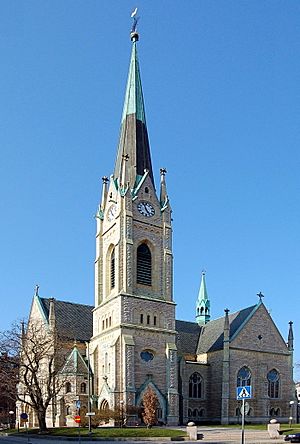Oscar Church facts for kids
Quick facts for kids Oscar Church |
|
|---|---|
|
Oscarskyrkan
|
|

The Oscar Church in April 2006
|
|
| Location | Östermalm, Stockholm |
| Country | Sweden |
| Denomination | Church of Sweden |
| Website | oscarsforsamling.se |
| Architecture | |
| Architect(s) | Gustaf Hermansson |
| Style | Gothic Revival |
| Years built | 1897–1903 |
| Completed | September 1903 |
| Administration | |
| Parish | Oscar Parish |
| Diocese | Diocese of Stockholm |
The Oscar Church (called Oscarskyrkan in Swedish) is a beautiful church in Stockholm, Sweden. It's a large church that can hold 1,250 people. The church has a tall tower, about 80 meters (262 feet) high, located on its southwest side.
The Oscar Church opened in September 1903. Its design was chosen after a competition held nine years earlier. Gustaf Hermansson won the competition and became the architect. He also designed another famous church in Stockholm, the Sofia Church.
You can find the Oscar Church in the southeastern part of Östermalm, a district in Stockholm. It's located where two streets, Storgatan and Narvavägen, meet. It's also close to the Swedish History Museum. Narvavägen is one of Stockholm's main boulevards, known for its grand buildings.
Contents
How the Church Got Its Name
The Oscar Church was named after King Oscar II of Sweden. He was the king when the church was being built. King Oscar II himself helped start the construction by laying the foundation stone in 1897.
The building work faced some challenges. There were issues with the church's foundation and delays in getting materials. Also, there were some worker strikes. Because of these problems, the church wasn't officially opened until 1903.
Design and Style
The church was first planned to have parts covered in brick. However, this idea was changed. Instead, the entire outside of the church was made uniformly white. It was covered with limestone and marble.
The church's design is in the Gothic Revival style. This means it looks similar to the grand Gothic churches built many centuries ago. Even when it was being built, some people had different opinions about this style choice.
Changes Over Time
The Oscar Church has been updated several times since it was built. These updates helped keep the church beautiful and functional.
Early 20th Century Updates
Between 1921 and 1923, major changes were made inside the church. New stained glass windows were added. These beautiful windows were designed by an artist named Emanuel Vigeland. The work was overseen by architect Lars Israel Wahlman. He was also known for designing the Engelbrekt Church.
Mid-20th Century Updates
More changes were made to the church's interior between 1954 and 1956. During this time, the altarpiece was changed. Some of the decorative patterns on the ceiling were also removed to give the church a slightly different look.

